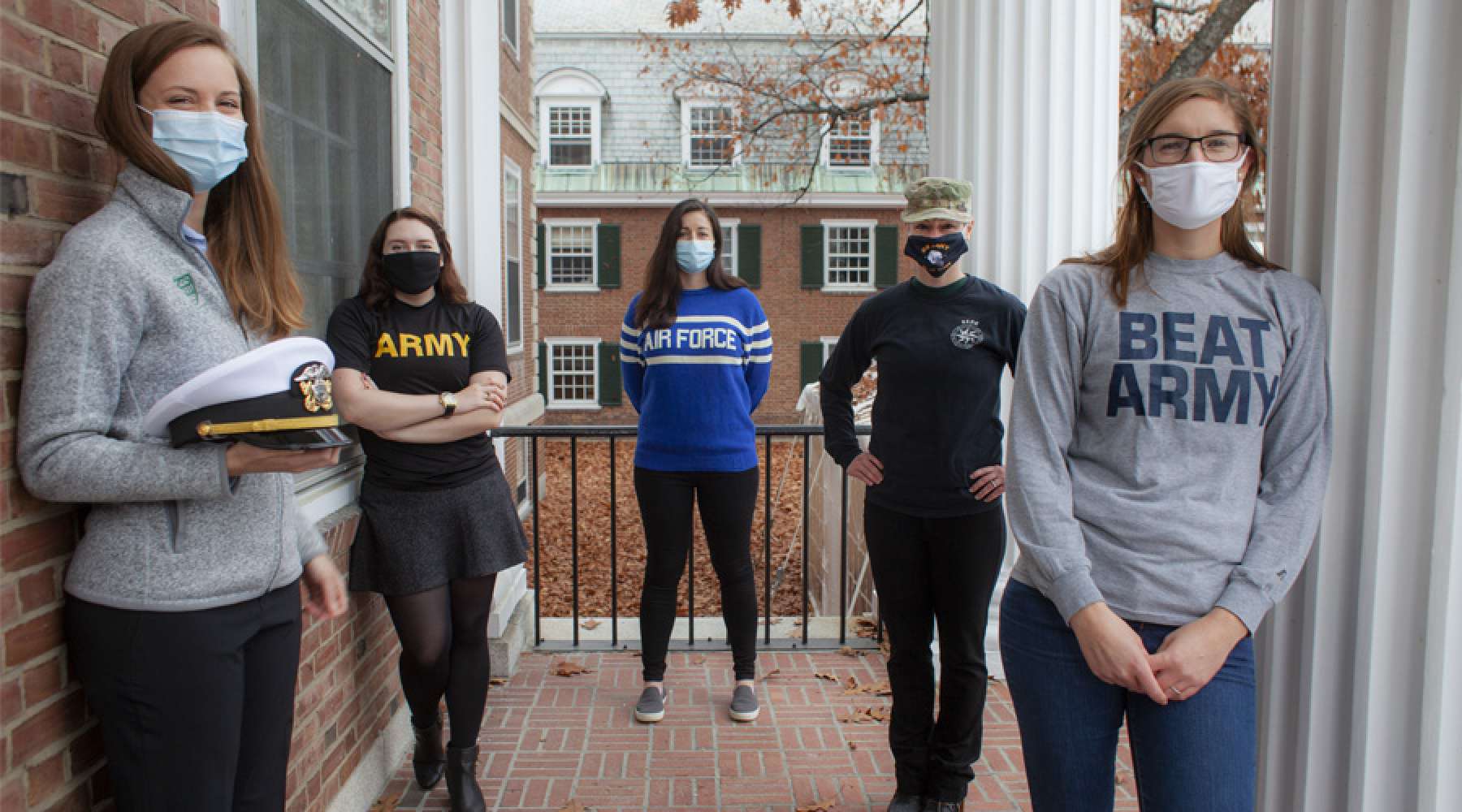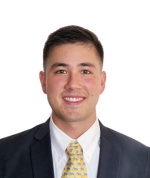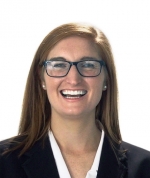
In honor of Veterans Day, Lesley Nesbitt, associate director of admissions and military liaison, sat down with military veterans T’22 Blair Bloomquist (pictured above, far right), Wen Barker T'21, and Paul Dell’Isola T'21 to discuss their Tuck experiences and advice for military applicants. In Part I of this conversation, Blair, Wen, and Paul explain the impact of the Tuck veterans community, the value of interacting with ambassadors during the application process, the power of Tuck’s study groups and small class size, and more. Stay tuned for Part II, where Wen and Paul discuss the similarities between Tuck and the military and how Tuck creates an inclusive environment for partners.
Lesley: The Tuck Veterans Club is committed to providing resources and support to veterans at Tuck and their families through integration, recruitment, and veterans’ networking initiatives. What are some of the most impactful or memorable experiences you’ve had as part of the Tuck Veterans Club?
Blair: How helpful second-years Sarah Blatt T'21 and Anna Douglas T'21 have been, and Jen Tietz T’15, former U.S. Navy Officer and current Associate Director of Career Services. Just having that sense that I can call and say, “I'm having a really bad day.” Even only having met once or twice in person. I feel like these connections are a lot stronger than it may have been if I was in a larger program. I think that's really important, and particularly for transitioning (out of the military). Feeling like there is someone that you can lean on either in your own class or above. And I think that continuing to strive for more female representation is really important. The more that we have here in the student body, the more we will get in the future.
Wen: It was clear to me that the admissions office was very interested in creating a truly diverse cohort of 285 students, including people from different services, people from different walks of life, and it's hugely beneficial having female veterans in our class. This is sort of tangentially related, but I think it is relatable: I came here proud of my service but also very adamantly not trying to just silo myself into the (vets) culture. And, for me, coming from the Marine Corps, I definitely wanted to expand beyond that and I think that a lot of my peers share that same sort of worldview.
Blair: I was cognizant of this when looking at business schools because I felt similarly. It's really nice to have a strong veterans’ cohort when you come in and you don't know anyone, and you feel like other people might have connections from the same industry or undergrad experience. Walking into a room of 285 in a “normal” world and not knowing anyone but having at least the veterans’ community to feel like, “Okay, these are people I share something with.” I also think those are the people that are your lens into the programs prior to coming. Once you get here, that's not the only social scene but it’s the core of it, and it’s nice to have that. And it certainly is your first window into the social life at an MBA program.
Lesley: Thinking about what military applicants are considering as they're applying, what would you tell yourself now that you’re here, both Blair as a first-year and Wen/Paul as seasoned second-years?
Blair: What happens is a lot of people will apply to the top 10 programs without giving a lot of thought to how the schools might be similar or different from each other. For example, there are real cultural differences among the top 10 schools. So I would recommend trying to figure out what you actually want and not going to a program because of its ranking or what the external perception is of that school. Obviously, perception is very important, but take the time to figure out whether you are going to have the resources to lean on or are you just going to be one of 400 or 500 or 800. Do your due diligence and have real conversations to make sure you know why you're applying, other than where a school ranks.
Wen: I sympathize with that whole scenario. And that's because that's what I did initially. I was biased because I looked at Dartmouth for undergrad and I'm from the Northeast, but I definitely looked at the top 10. I totally understand why people have the next job in mind. But I think what I would have wanted to know, and what people should think about, is what is intrinsically tied to your experience at the school. So its academics and social life—the two are not mutually exclusive from your professional goals—and it was daunting coming in. I don't know that I would have been as successful if Tuck didn't have a culture where the vets provided a safety net to fall back on. What's more, we had the second-years to share resources with us and coach us through not only professional but academic pieces, too. I’d recommend paying attention to culture and fit and how the community supports you through all of your academic and professional goals.
Another piece of advice regarding things that I wish I'd known, I wish I had talked to more alumni as an applicant. I definitely oriented my conversations with either the admissions team or current students, which I think you absolutely should do. But one of the biggest differentiating factors of Tuck is how strong their alumni network is and I've only been able to see that after having been admitted. And that's the kind of thing that I really wish I'd known because if you're going to talk about professional goals that's where it's really going to matter. Name brand doesn't matter, all the top firms are recruiting here and at the other top schools, so what's really going to make the difference is the responsive network. I've just had tremendous fortune reaching out to Tuckies who are jumping through hoops to help me, which is awesome. Then you can't help but want to pay it forward. That's how the cycle continues.
Paul: I definitely highlight that pretty heavily too because, for me, I used my interactions. And because I know what it was like to apply to other schools and the support I got from other schools. So I usually tell applicants to use that as a piece of data. Did you get along with the people you talked to or did you even get a response? Because for us, we try to contact them within 24 hours and have a phone call within a week. I usually try to impress on applicants to not take that for granted and understand that that's part of your admissions decision and that that reflects on the school.
Lesley: I appreciate you saying that because I have tried to highlight the loyal and responsive network, to have a network around you, to have alumni who will see your email come into their inbox and feel like, “I'm on it. That's my top priority right now.” The power of the network feels really compelling, now more than ever. So I agree that is great advice regarding talking to the alums of a given school when you are deciding where to apply and where to enroll.
Paul: I think the biggest thing for me—it's what I usually try to impress on the vets that are applying—is knowing how special and how helpful the vets club was for me to get a job, to get through first year, to go through that whole process. I didn't realize I was going to lean so heavily on my vet classmates. I was expecting to come to Tuck and to shed the military side of my life and to start fresh and start new, but from the first day of Admitted Students Weekend, I was instantly plugged into the vets network. You get a taste of it when the admissions liaison reaches out to you on notification day, getting a call when you actually get in – that meant a lot to me. I recognized the leadership of the club right away, but during the first year I think it was underscored to me how helpful the second-years were and that wasn't something that was “pitched” during the admissions process. Now when I'm talking with a prospective applicant, I emphasize that aspect because almost all of my case prep, almost all of my interview prep, a lot of deciding what classes to take, I leaned heavily on the second-year vets. It's been nice for my class year because we walked in knowing some second-years, and therefore had a community that we could turn to and that could open some doors. Understanding that as you're applying to a school is really important because I didn't consider how much value-added that would be; I originally would have been much more impressed with the Career Services piece and things like that.
Lesley: The other thing I was thinking about is the community investment in general at Tuck, not just within the Vets Club but throughout the school, especially for recently separated folks or those who are about to leave the service. You're still trying to find your way so the people elements of your business school experience matter a lot: the people, the attitudes, and the ethos, and this is still true during the pandemic when we're not all together in the buildings. You were touching on this, but I think it's worth repeating explicitly: when you're leaving the military and going into the private world, you have these incredible experiences that you leverage, but you're also in this powerful period of transition and change. So having a school around you that “fits” is key. Do you feel like that rings true? Could you speak to how the “soft” aspects have impacted your path, especially as second-year students?
Paul: For me, the approachability and affability of my classmates were a big part of it because I was really interested to learn about my classmates who are in consulting and learn about the industry I wanted to go into after graduation. I wanted to learn directly from them, rather than through some kind of company briefing or cases. The culture of being able to talk to my classmates about that comes a lot faster and earlier on at Tuck than it would at a school that's bigger. I felt like I was able to have those conversations during Tuck Launch in the first couple of weeks. Originally I was thinking of going into banking or general management but three weeks later I felt fully invested in the consulting track; part of that transition came from talking to those recruiters specifically but also to my classmates. It was really easy to tap my friends on the shoulder a week or two into class, and say, “Hey, I'm really interested to know what this industry is like.” I felt really secure being able to explore those different opportunities. Similarly in my study group it was really easy to hash those things out frankly without having to worry about someone judging me.
Wen: I would definitely agree with you on the study group. I think the study group was really an awesome tool to facilitate that. Certainly academically having some people who knew what they were doing up front, but also like what Paul said, Tuck intentionally brings together people from different backgrounds. It was a good way to get a quick sense of what people's backgrounds were and what careers seemed viable or interesting. I think the small class size lends itself to getting to know your classmates, while also enabling you to dive deeper to make more meaningful connections and to get a better sense, maybe more readily than if you were at a much bigger school.

Wen Barker T’21
Wen grew up in Cos Cob, CT and graduated from Bowdoin College with a B.A. in Mathematics in 2014. Upon graduation he commissioned into the U.S. Marine Corps and served for five years as a Logistics Officer with 2nd Battalion, 3rd Marine Regiment in Kaneohe Bay, HI. During his time with 2/3, he participated in three forward deployments to Okinawa, Japan, first as the Motor Transport Platoon Commander and later as Assistant Logistics Officer and assisted in planning support for bilateral training with regional allies across the Pacific. Wen is married to Morgan Barker of Belleville, IL and enjoys running, hiking and skiing in his free time. Summer Internship: Bain & Company, Inc.

Blair Bloomquist T’22
Blair grew up in Menlo Park, California and graduated from Barnard College of Columbia University in 2014 with a BA in Psychology and Biology and was a member of the Columbia Women’s Swim Team. She then completed the 15-month accelerated BSN program at Johns Hopkins University School of Nursing. Blair commissioned as a Naval Nurse Corps Officer in February 2016 and served as an emergency-trauma nurse for 4.5 years at Naval Medical Center San Diego and First Medical Battalion, Camp Pendleton. Blair is passionate about making healthcare more accessible and affordable for all, and continues to serve in the Navy Reserves. Blair is engaged to Scott Rowe, a Naval Aviator, and in her free time she enjoys Peloton cycling, cheering on the Baltimore Ravens, and scuba diving.

Paul Dell’Isola T’21
Paul grew up in Bethesda, MD and graduated from the US Coast Guard Academy with a B.S. in Management in 2014. Upon commissioning, Paul joined the crew of the CGC CYPRESS (WLB 210) as a deck watch officer and law enforcement officer in Pensacola, FL. Subsequently, Paul served as the Executive Officer onboard CGC EDISTO (WPB 1313). Paul completed his final year of service working as the budget officer for 15 major cutters in the Pacific Area. In June of 2019, Paul chose to resign his commission and join Tuck to help his transition into the business world. In his free time, Paul enjoys surfing, skiing, and travel. Summer Internship: Deloitte Consulting and Patagonia